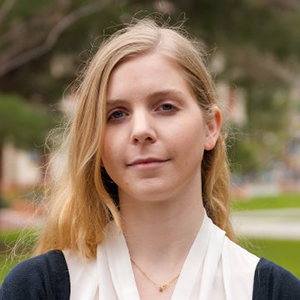Why graduate students should
join scientific societies
Scientific societies — I’m sure you’ve heard of them. They’re the standard for how scientists band together. Scientific societies serve an important purpose, whether it be to exchange ideas among members or to rally together to advocate as a unified voice for government support. But are you a member of one? Being a part of a scientific society as a graduate student communicates a specific message.
Let’s take me, for example. I’m a graduate student member of the American Society for Biochemistry and Molecular Biology. When I was an undergraduate at San Francisco State University, I helped found an ASBMB Student Chapter and was involved in K-12 outreach in my community. As a Ph.D. student at the University of California, Davis, I became a member of the ASBMB Educational and Professional Development Committee; I serve on the graduate and postdoc subcommittee, which focuses on enhancing the ASBMB’s service on issues related to training and career development for these groups. I identify as an American scientist in the field of biochemistry and molecular biology who has chosen to be affiliated with a community of like scientists at various career stages.
Society membership shows an interest and willingness to be involved in your scientific community. You do not want to communicate an unintended message by not joining any scientific society as a graduate student. Inaction here does you no favors. And as I hope to prove to you with this article, a plethora of benefits are available if you get involved in a scientific society. If you are a graduate student (or know a graduate student), please read this (or give this to them) for a list of reasons that should serve as a catalyst to get you past that activation barrier, if you will. 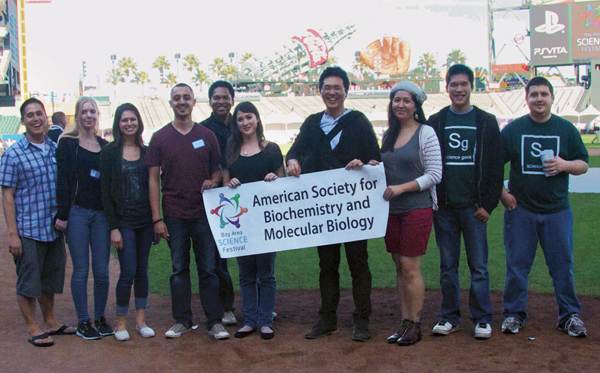 Shea Feeney, second from left, and other members of the ASBMB Student Chapter she helped found at San Francisco State University pose at the Bay Area Science Festival at AT&T Park. photos courtesy of Shea Feeney
Shea Feeney, second from left, and other members of the ASBMB Student Chapter she helped found at San Francisco State University pose at the Bay Area Science Festival at AT&T Park. photos courtesy of Shea Feeney
Be a scientist within a community of scientists
As mentioned above, by joining a society, you are communicating to your field (and on your CV) what kind of scientist you identify as and what community of scientists you are affiliated with. And by joining a community of scientists in a field you care about, you can enhance the power of their collective voice.
Network, network, network
Now that you have identified your community, you should leverage this by building your network. By being a part of a scientific society, you already have built a link, but you also have opportunities to meet people face-to-face at the annual meeting and smaller conferences held throughout the year. Being a part of a society enables you to grow a large network — which is good, because you never know when you may need to turn to someone for more in-depth advice and have them become a mentor, which brings us to …
Find new mentors
Take advantage of a mentorship program or leverage your network to gain a new mentor from your scientific society. Your PI is, hopefully, not the end of the line when you seek advice. Building out your mentorship can be particularly helpful if you want to pursue a career path outside the traditional tenure-track faculty position. For instance, I have been expanding my own network by being involved with the ASBMB, and I have asked several of my new contacts informally to do informational interviews. This has helped me to gain new insights into and advice about nontraditional career paths.
Develop professionally
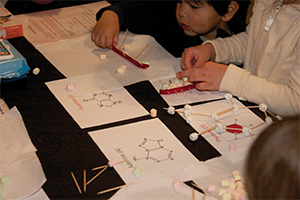 Feeney and other members of the San Francisco State University ASBMB Student Chapter showed children how to make DNA double helices out of licorice and marshmallows during the Bay Area Science Festival. Resources for career and professional development are priceless for graduate students. The ASBMB has many resources — from an entire course about the art of science communication to career development webinars on a range of topics from building your CV to the future of the biomedical research workforce. If you want to work on building your skill set (and now is always the time to do so), you need this kind of resource to sharpen your competitive edge. Please don’t fall into the trap of thinking you can delay working on your professional development until you start looking for a job while the rest of your peers are starting now. Working on skills such as communication will help you at any stage. I speak from my direct experience with using the ASBMB’s professional development resources and can vouch that they have been incredibly helpful and gave me new insight into different career paths, from careers in science writing to science policy, so I feel more informed about the options available. Moreover, I believe these resources help give a strong foundation for skill sets needed for any career path (for example, science communication and building a strong CV are important for most careers in science).
Feeney and other members of the San Francisco State University ASBMB Student Chapter showed children how to make DNA double helices out of licorice and marshmallows during the Bay Area Science Festival. Resources for career and professional development are priceless for graduate students. The ASBMB has many resources — from an entire course about the art of science communication to career development webinars on a range of topics from building your CV to the future of the biomedical research workforce. If you want to work on building your skill set (and now is always the time to do so), you need this kind of resource to sharpen your competitive edge. Please don’t fall into the trap of thinking you can delay working on your professional development until you start looking for a job while the rest of your peers are starting now. Working on skills such as communication will help you at any stage. I speak from my direct experience with using the ASBMB’s professional development resources and can vouch that they have been incredibly helpful and gave me new insight into different career paths, from careers in science writing to science policy, so I feel more informed about the options available. Moreover, I believe these resources help give a strong foundation for skill sets needed for any career path (for example, science communication and building a strong CV are important for most careers in science).
Get involved beyond the bench
As a member of a scientific society, you can become involved in activities beyond your bench work. Perhaps you’d find it rewarding to advocate for the science in your field. The ASBMB offers a policy fellowship that brings graduate students to Capitol Hill (if you are interested in science policy, I encourage you look up the ASBMB’s Capitol Hill Day or the ASBMB policy blotter). The societies also offers opportunities to get involved as a graduate student in its committees or in specific student leadership positions. This is the pathway I took by joining the Education and Professional Development Committee as a Ph.D. student. After being involved in a Student Chapter for undergraduates, I wanted to continue with the ASBMB and do some form of outreach. Improving and increasing access to science education is particularly meaningful to me, and being on this committee gives me experience beyond my bench work in the lab in an area that is personally important and professionally relevant.
Get more perks
Although you pay nominal dues to join the ASBMB as a graduate student, you can recoup this cost through all the intangible benefits listed above and also the tangible benefits of direct discounts on conferences and opportunities to apply for travel awards and fellowships. The 2019 ASBMB annual meeting will be held in balmy Orlando, April 6-10. Registration is discounted for graduate student members, and travel awards are available — so do remember to apply. The ASBMB also offers members free online subscriptions to its journals, including the Journal of Biological Chemistry, and the monthly magazine ASBMB Today (the awesome magazine you are reading right now, which welcomes personal essays from all ASBMB members, including grad students).
These have been the direct benefits of my own membership with the ASBMB. I strongly believe that any Ph.D. student can leverage these same advantages and more. It really boils down to a simple cost-benefit analysis. If you are interested in all that the ASBMB has to offer, I hope you will rest your weary lab-trotting feet for a few minutes and sign up on their website to join a community of more than 11,000 ASBMB scientists.
Enjoy reading ASBMB Today?
Become a member to receive the print edition monthly and the digital edition weekly.
Learn moreFeatured jobs
from the ASBMB career center
Get the latest from ASBMB Today
Enter your email address, and we’ll send you a weekly email with recent articles, interviews and more.
Latest in Opinions
Opinions highlights or most popular articles

A paleolithic peer review
You might think review panels have only been around for the last century or so. You would be mistaken.

Early COVID-19 research is riddled with poor methods and low-quality results
The pandemic worsened, but didn’t create, this problem for science.

So, you went to a conference. Now what?
Once you return to normal lab life, how can you make use of everything you learned?
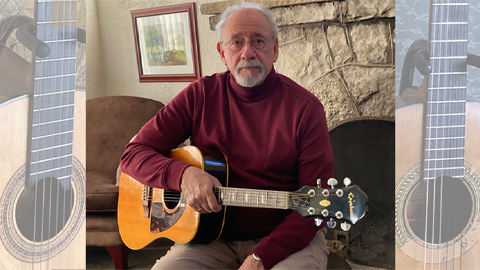
My guitar companion
A scientist takes a musical journey through time and around the world.
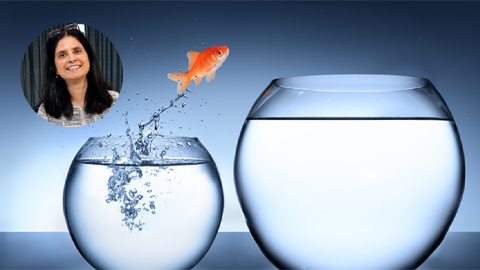
Catalyzing change and redefining purpose
To mark Women’s History Month, Sudha Sharma writes about her journey from focusing on her own research program to being part of a collaborative COVID-19 project.
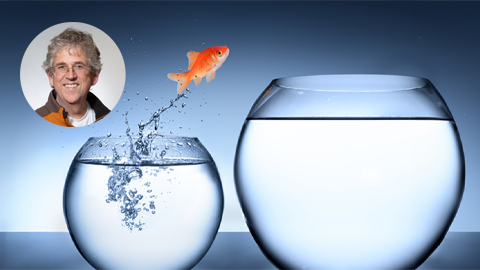
The power of sabbaticals
To mark Women’s History Month, Nicholas Rhind writes about learning techniques in other researchers’ labs that empower the work in his own.

